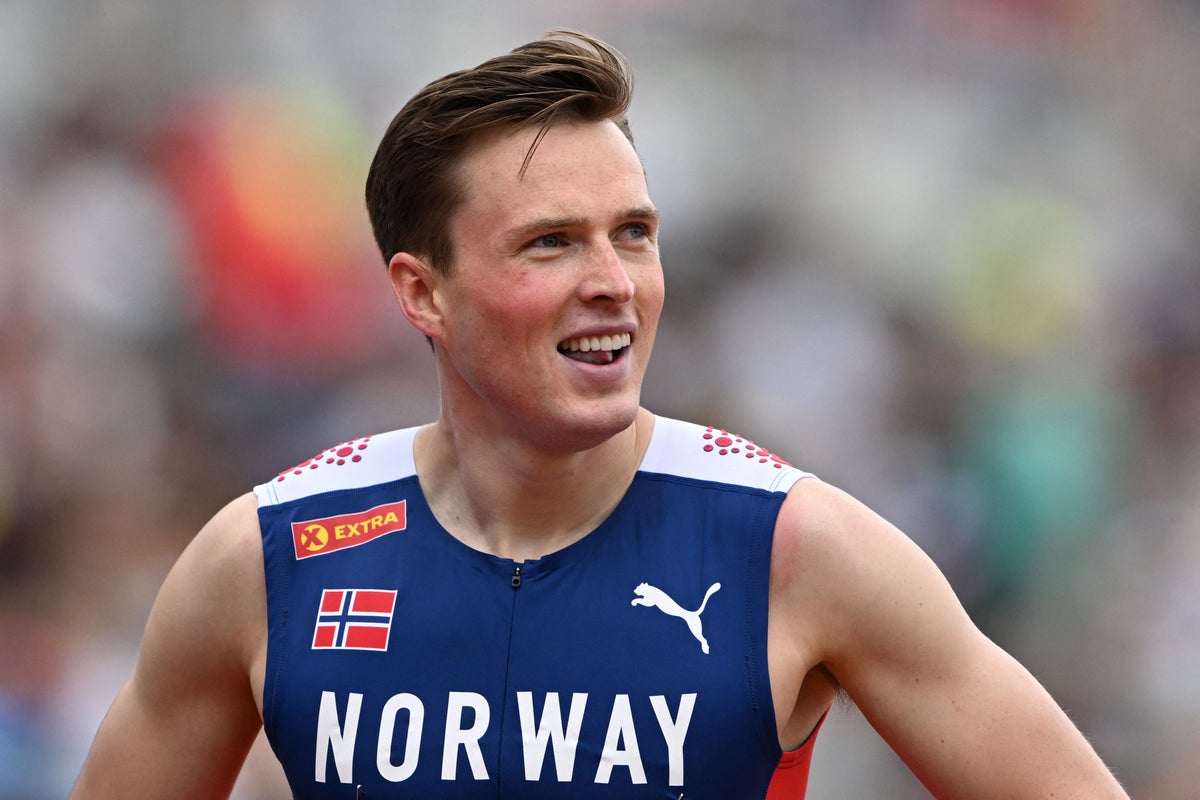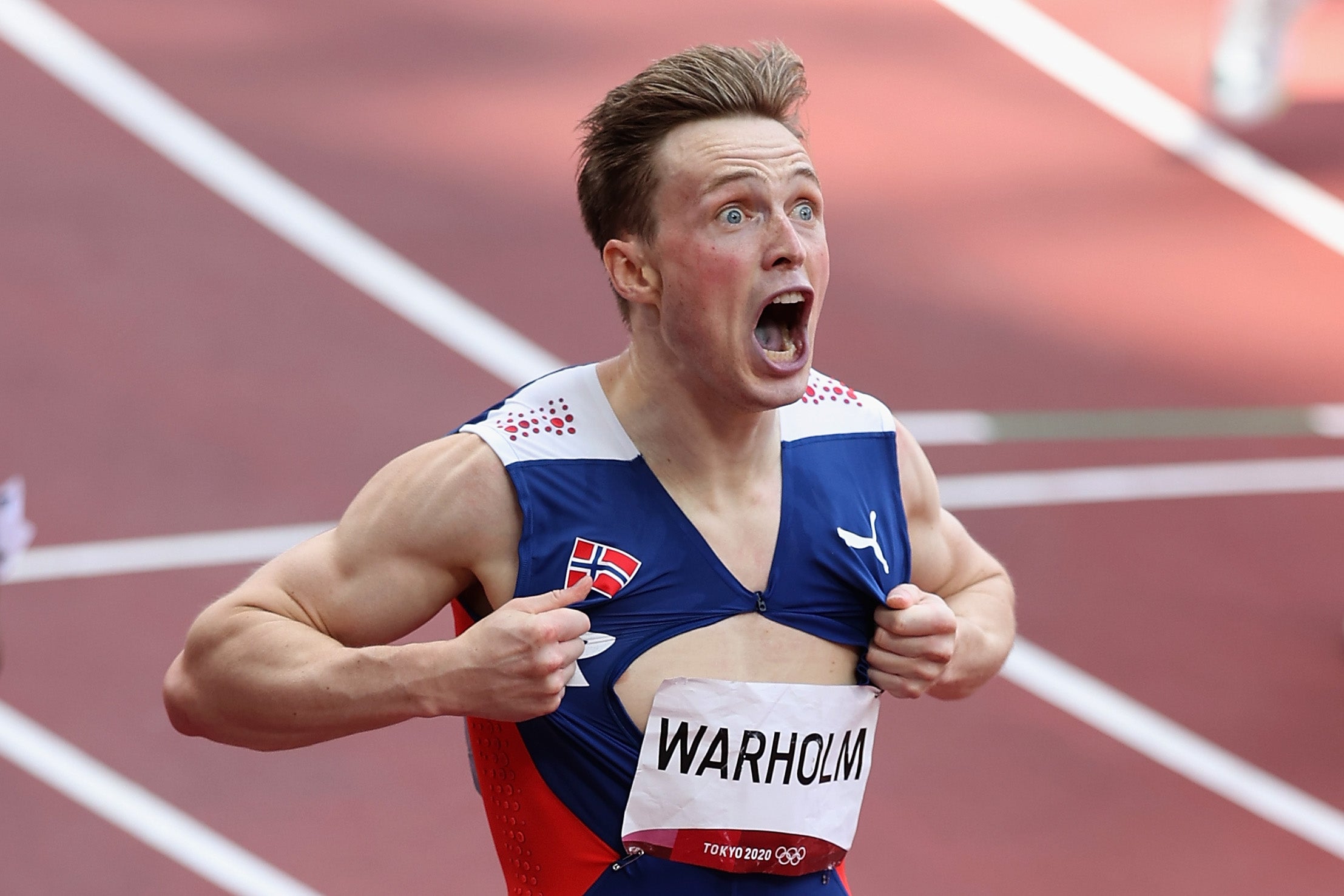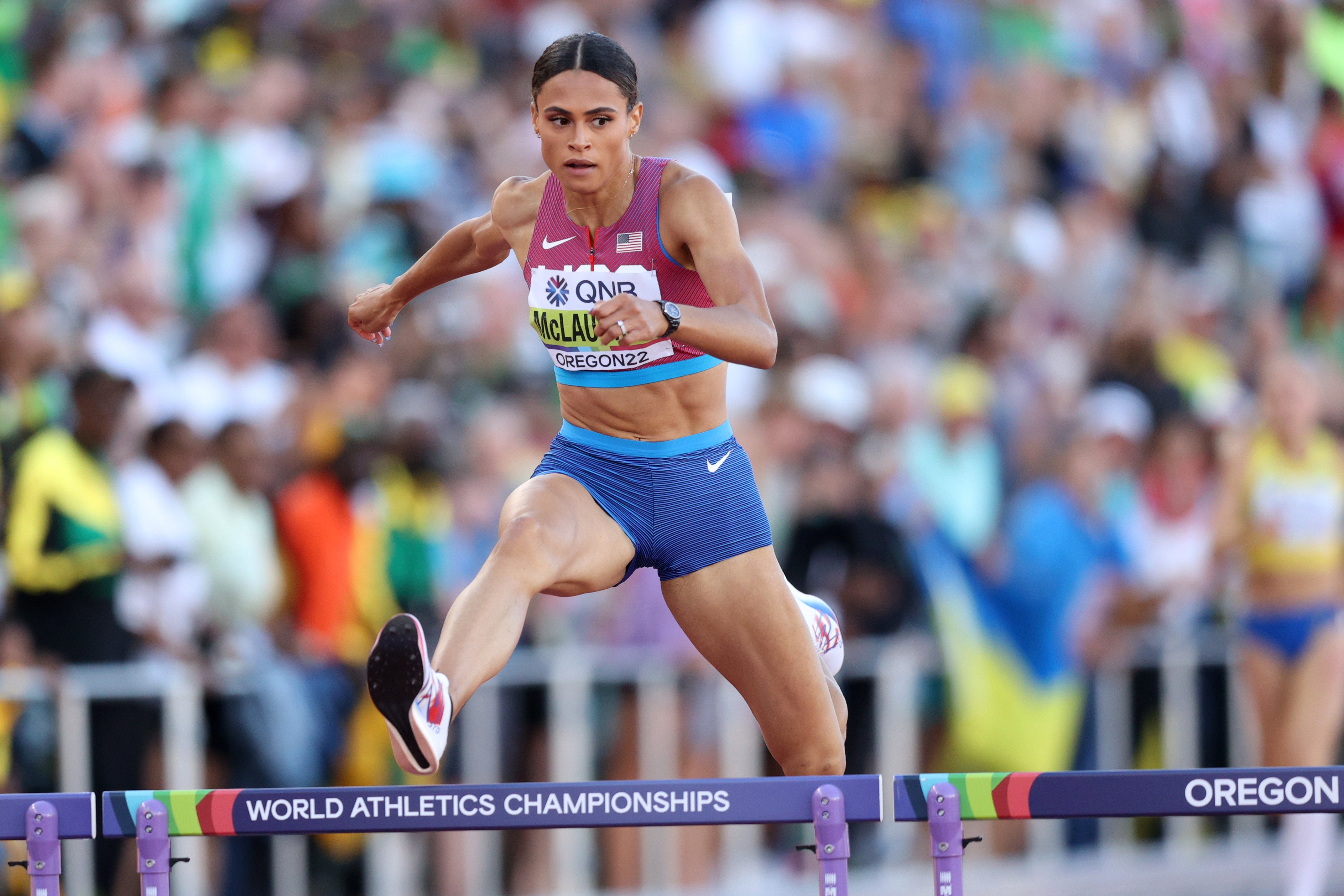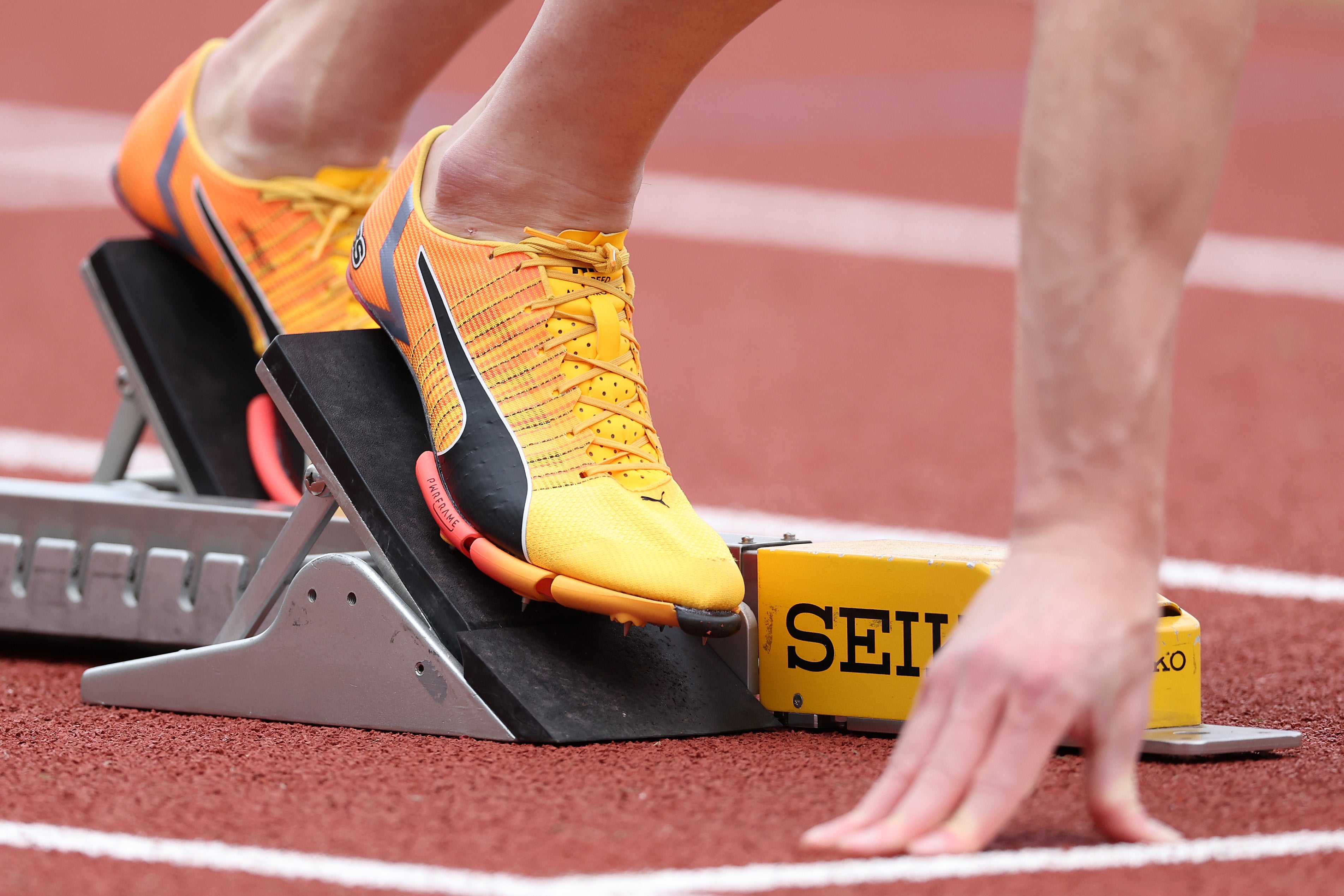
Karsten Warholm is getting closer. Closer to that feeling of invincibility bottled up on that iconic afternoon in Tokyo last summer. Gliding for 45.94 mesmerising seconds, winning Olympic gold, setting a new world record, and reimagining what is possible in the 400m hurdles.
The Norwegian changed the game. But now he is searching for redemption after suffering a torn hamstring at this year’s Rabat Diamond League, six weeks before the World Championships in Eugene. The 26-year-old persevered in Eugene, but eventually succumbed to the pain and lack of rhythm from missed training, his hopes of retaining the world crown scuppered. He finished a lowly seventh, behind Alison Dos Santos, who surged to gold in 46.29 seconds, the second-fastest time in history.
“It’s been special,” Warholm tells The Independent, reflecting on a rare defeat, having entered the year unbeaten since the Continental Cup in Ostrava in 2018. “I’ve been living on this pink cloud, everything I tried to do, I made it happen. To be in a challenging position like this now, it gives me something to think about. Also, something good has come out of it: my motivation is higher than ever before. I want to get back to winning ways. The good feelings and the adrenaline after a race, which I absolutely didn’t have in Eugene.
“I think you will see me winning again soon and then I’ll be very happy, but also a bit relieved, as when you win you get a special feeling, but you also forget it very quickly. It’s like going out at the weekend, it’s super fun, but then you get a hangover, and you want to experience it again. In championships it’s once or twice per year, you need to take care of those moments.”
It is why Munich serves as more than just an opportunity to extend his reign in Europe, having triumphed in Berlin four years ago. He hopes to apply lessons just four weeks on from his humbling at the World Championships. Training has been smooth. The athlete has regrouped with long-time coach and friend Leif Olav Alnes in the tranquillity of Bergen, Norway. Together they hope to harness a “very special and unique relationship” and a near-insatiable desire to win on their “mission” to return to the top.

“It’s of course very nice to have Tokyo to think about,” Warholm reflects. “In difficult times it’s nice to see what you have achieved. I wouldn’t trade Tokyo for anything, that’s the most important win of my life and probably will be forever.
“But I don’t want to think about the past, I’m a guy who looks forward. I always have new goals and high expectations and those are only when I look forward. It’s hard to tell where my mentality came from.
“My forefathers in Norway, they’re tough, if you go long enough back, they’re Vikings. It’s the attitude, it’s my job; I’ll do it with pride. I’ll do it with everything I have that has to be done to make sure the job is well done.
“I’m not afraid of lactate, but I’m very afraid of having a bad race. I will always go out hard and try to give it everything I have. There’s this thing, the warrior doesn’t always win, but he always fights, and that’s what I live by.”
We may well see Warholm’s famous celebration – ripping open his speed suit like Superman – in Munich. But the form of France’s Wilfried Happio – fourth in Eugene and an entire second quicker than Warholm – adds extra intrigue and tension to these European Championships, even without Dos Santos and Rai Benjamin.
The 400m hurdles has exploded for women too, with Sydney McLaughlin leaving the world awestruck once again in Eugene after another incomprehensible world record of 50.68 seconds, shaving 0.73 seconds off her previous mark. It was a time that would have seen the American finish seventh in the women’s 400m final this summer. It’s not just a step forward, but much like Warholm in 2021, it’s a giant leap in human performance after the Norwegian’s own 0.76-second improvement. McLaughlin’s gracefulness impressed Warholm – and inspired him to recapture his own supremacy.
“I think that's one of the most beautiful things about track and field,” Warholm says when recounting McLaughlin’s greatness. “You can actually measure the performance and see how we as humans develop given the performances.
“When I saw Sydney run the 400m hurdles in Eugene, it was a magical moment. It’s very difficult for people not in the sport to realise how quick this really is, going over hurdles as well, it would be so quick without them too, it’s the same with me.
“It’s cool to see all the hours you put in to achieve perfection and it goes down to a world record that nobody thought would happen.
“This will change the women’s 400m hurdles, people will see what is possible, I think people will come closer to what she’s done.

“And also on my side, there are now guys running really fast times. They’re pushing the limits and that’s the beauty of the sport.”
Warholm is a self-confessed sports addict, who says he was “very good” at football before focusing on athletics. Norway is perhaps enjoying a golden era in sport: Jakob Ingebrigtsen is dominant in both the 1,500m and 5,000m; Erling Haaland is poised to spearhead Manchester City to the very top of European football; and Casper Ruud reached the French Open final earlier this year.
Warholm believes his breakthrough world title at London 2017 has shown what is possible in the event. And his excitement grows when discussing the prospect of the 400m hurdles becoming the iconic event of a generation in athletics. So why has it seen such remarkable progress?
Some experts maintain the effect of carbon-technology shoes is more pronounced in the 400m hurdles than other events. Warholm, a Puma athlete, has previously been outspoken on shoe technology and how it could “hurt athletes’ credibility” given its “trampoline” effect.
But the two-time world champion points to a shift in mindset and strategy, with past competitors unwilling to push hard early in the race and risk an abrupt, painful finish. This, coupled with a new wave of talent previously attracted to other events, should extend the event’s run of astonishing times.

“This is where it gets tricky, I think when myself and my coach started working at this event, we started going out really hard,” Warholm recalls. “Nobody ever really did in the hurdles, people were running very controlled and saving themselves for the last 150m and then going all out.
“But we started going out hard, treating it as a sprint, the 400m hurdles has big status in the track and field environment – all the good athletes now turn to the 400m hurdles. It’s not like if you’re not good enough for the 400m, you turn to the 400m hurdles, no.
“You do the 400m hurdles because you like that event. It’s a cool event now. A lot of 400m hurdlers could be big players in the 400 if they wanted to. It’s very difficult because it’s a very specific thing with the hurdles. A lot of good athletes, world-class athletes, they’re pushing the level and what is possible.”







